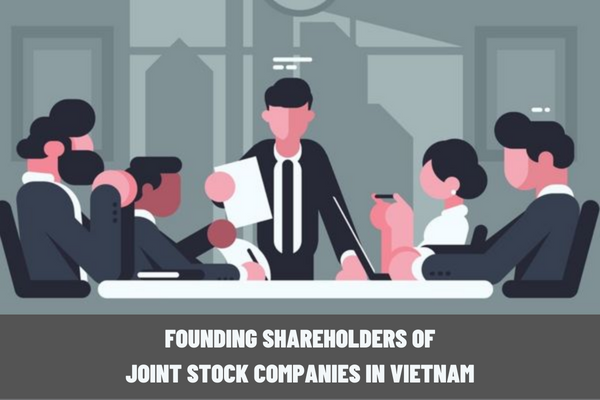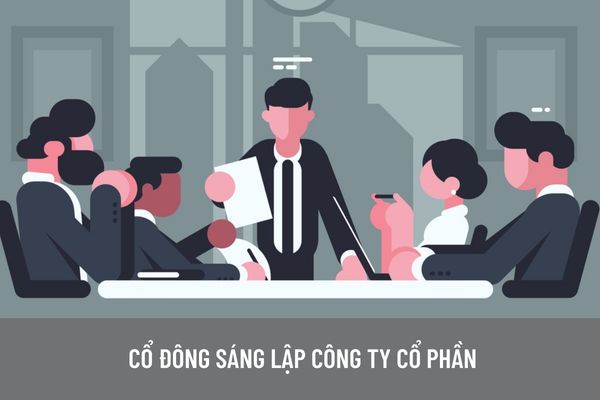What are the requirements to become founding shareholders of joint stock companies in Vietnam? Can founding shareholders transfer shares when a new enterprise is established?
What are the requirements to become founding shareholders of joint stock companies in Vietnam?
Pursuant to Clause 4, Article 4 of the 2020 Law on Enterprises in Vietnam stipulating:
Definitions
…
4. “founding shareholder” means a shareholder that holds at least an ordinary share and has his/her signature in the list of shareholders that are also founder of the joint stock company.
According to the provisions of Clause 1, Article 57 of Decree No. 01/2021/ND-CP stipulating as follows:
Notification of changes in information about founding shareholders of unlisted joint-stock companies
1. A founding shareholder defined in Clause 4 Article 4 of the Law on enterprises is a shareholder that holds at least an ordinary share and has his/her signature in the list of founding shareholders submitted to the Business Registration Office at the time of application for enterprise registration.
In addition, Clause 2, Article 120 of the 2020 Law on Enterprises in Vietnam stipulates ordinary shares of founding shareholders, according to which:
Ordinary shares of founding shareholders
…
2. The founding shareholders shall subscribe for at least 20% of the total authorized ordinary shares upon enterprise registration.
Thus, to become a founding shareholder, it is necessary to meet the following requirements:
+ Hold at least an ordinary share
+ Have his/her signature in the list of founding shareholders submitted to the Business Registration Office at the time of application for enterprise registration.
+ Subscribe for at least 20% of the total authorized ordinary shares upon enterprise registration.

What are the requirements to become founding shareholders of joint stock companies in Vietnam? Can founding shareholders transfer shares when a new enterprise is established?
Can founding shareholders transfer shares when a new enterprise is established?
Pursuant to Clause 1, Article 127 of the 2020 Law on Enterprises in Vietnam stipulating as follows:
Transfer of shares
1. Shares may be transferred freely except the cases specified in Clause 3 Article 120 of this Law and other cases of restriction specified in the company's charter. The restrictions on transfer of shares specified in the company's charter are only applicable if they are written in the certificates of the shares subject to restriction.
2. The transfer shall be made into a contract or carried out on the securities market. In case of transfer under a contract, the documents shall bear the signatures of the transferor and the transferee or their authorized representatives. In case shares are transferred on the securities market, the transfer procedures prescribed by securities laws shall apply.
3. In case of the death of a shareholder that is an individual, his/her heir at law or designated by a will shall become a shareholder of the company.
4. In case a shareholder that is an individual dies without an heir or the heir refuses the inheritance or is disinherited, his/her shares shall be settled in accordance with civil laws.
5. A shareholder may donate all or part of their shares to other organizations and individuals; use the shares to pay debts. The organization or individual that receives the donation or debt payment will become a shareholder of the company.
6. The organizations and individuals that receive shares in the cases specified in this Article will only become shareholders when the information specified in Clause 2 Article 122 of this Law is fully recorded in the shareholder register.
7. The company shall register the changes of shareholders in the shareholder register as requested by relevant shareholders within 24 hours after the request is received.
Referring to Clause 3, Article 120 of the 2020 Law on Enterprises in Vietnam as follows:
Ordinary shares of founding shareholders
...
3. Within 03 years from the issuance date of the Certificate of Enterprise Registration, the ordinary shares of founding shareholders may be transferred to other founding shareholders and may only be transferred to a person that is not a founding shareholder if the transfer is accepted by the General Meetings of Shareholders. In this case, the transferor does not have the right to vote on this transfer.
Thus, according to the above provisions, within 03 years from the issuance date of the Certificate of Enterprise Registration, founding shareholders may transfer their ordinary shares to other founding shareholders.
In case of transfer to a person who is not a founding shareholder, it must be approved by the General Meeting of Shareholders.
What are the obligations of shareholders of joint stock companies in Vietnam?
Pursuant to Article 119 of the 2020 Law on Enterprises in Vietnam on the obligations of shareholders as follows:
- Fully and punctually pay for their subscribed shares.
- Do not withdraw contributed capital in the form of ordinary shares in any shape or form, unless the shares are purchased by the company or other persons.
The shareholder that withdraws all or part of the share capital against regulations of this Clause and persons with related interests in the company shall have a liability for the company’s debts and other liabilities which is equal to the value of the shares withdrawn and the damage caused by this action.
- Comply with the company's charter, rules and regulations.
- Comply with resolutions and decisions of the Board of Directors and the GMS.
- Protect the confidentiality of information provided by the company in accordance with the company's charter and the law; only use the provided information to perform and protect their lawful rights and interests; do not spread or share information provided by the company to any other organization or individual.
- Other obligations prescribed by Law and the company's charter.
LawNet
